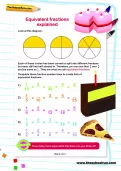Important update from TheSchoolRun
For the past 13 years, TheSchoolRun has been run by a small team of mums working from home, dedicated to providing quality educational resources to primary school parents. Unfortunately, rising supplier costs and falling revenue have made it impossible for us to continue operating, and we’ve had to make the difficult decision to close. The good news: We’ve arranged for another educational provider to take over many of our resources. These will be hosted on a new portal, where the content will be updated and expanded to support your child’s learning.
What this means for subscribers:
- Your subscription is still active, and for now, you can keep using the website as normal — just log in with your usual details to access all our articles and resources*.
- In a few months, all resources will move to the new portal. You’ll continue to have access there until your subscription ends. We’ll send you full details nearer the time.
- As a thank you for your support, we’ll also be sending you 16 primary school eBooks (worth £108.84) to download and keep.
A few changes to be aware of:
- The Learning Journey weekly email has ended, but your child’s plan will still be updated on your dashboard each Monday. Just log in to see the recommended worksheets.
- The 11+ weekly emails have now ended. We sent you all the remaining emails in the series at the end of March — please check your inbox (and spam folder) if you haven’t seen them. You can also follow the full programme here: 11+ Learning Journey.
If you have any questions, please contact us at [email protected]. Thank you for being part of our journey it’s been a privilege to support your family’s learning.
*If you need to reset your password, it will still work as usual. Please check your spam folder if the reset email doesn’t appear in your inbox.
What is a maintained school?

Making sense of the school system can be a bit like learning a different language. But while academies and free schools are becoming more prevalent, the vast majority of English primary schools are local authority (LA) maintained schools. So what does it actually mean if your child is enrolled in a maintained school?


Boost Your Child's Learning Today!
- Start your child on a tailored learning programme
- Get weekly English & maths resources sent direct to your inbox
- Keep your child's learning on track
Maintained schools explained
Put simply, maintained schools are those that are funded and controlled by the local education authority. They are different from free schools and academies, which operate outside LA control: these schools are run by trusts or sponsors such as parents’ groups, universities or businesses, and while they have to sign up for a government funding agreement, the school itself determines how to spend its budget.
Types of maintained school: community schools, foundation schools, VC schools and VA schools
There are four different types of maintained school.
Community schools are owned and funded entirely by the LA. The LA owns the land and buildings, funds the school, employs the staff, controls school admissions and supplies services such as special educational needs (SEN) support and educational psychology.
Voluntary controlled (VC) schools are partly controlled by a charity – typically a church or another religious institution. The LA funds the school, employs the staff and provides support services, and usually controls the admissions process. The charity owns the land and buildings and appoints some of the governors.
Voluntary aided (VA) schools are usually known as church or faith schools. They are similar to VC schools but have more independence from the LA. The land and buildings belong to a charity, but the governing body runs the school, employs the staff and controls admissions. Funding comes partly from the LA and partly from the charity.
Foundation schools are run by the governing body, which also owns the land and buildings, employs the staff, controls admissions and sources and buys in support services. The funding comes from the LA.
What is the difference between voluntary controlled (VC) schools and voluntary aided (VA) schools?
The main difference between the four types of school as far as parents are concerned is that VC, VA and foundation schools usually have a slightly different admissions procedure – for example, they may factor in church attendance as well as distance from the school, and you’re likely to have to fill in an additional application form, called a supplementary information form (SIF).
What do maintained schools do?
There are key differences between maintained schools and free schools and academies. One of these concerns the teaching. Maintained schools have to follow the National Curriculum, although they can focus on specific subjects (such as RE in a church school) as long as they meet the curriculum requirements across the board.
Maintained schools have to follow the SEN Code of Practice. Class sizes are capped at 30 pupils, and at primary level, they are not allowed to select pupils on the basis of their academic ability. They pay teachers according to the national pay scale and have to provide regular performance reviews.
For community schools, term dates and the timings of the school day are set by the LA (although they can choose their own INSET dates). Other types of maintained school have a little more freedom, but have to go through a formal consultation process if they want to change the timings of the school day.
Day to day, you’re unlikely to notice much difference between the four types of maintained schools, or indeed between maintained and non-maintained schools. All types of school (except independent schools) are inspected by Ofsted and have to meet national targets. And because all children have to be assessed at the end of Year 6, teaching content tends to be largely similar, even though non-maintained schools don’t have to follow the National Curriculum.








